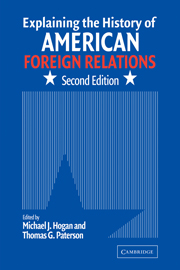Book contents
- Frontmatter
- Contents
- Preface to the Second Edition
- Contributors
- 1 Introduction
- 2 Defining and Doing the History of United States Foreign Relations : A Primer
- 3 Toward a Pluralist Vision : The Study of American Foreign Relations as International History and National History
- 4 Theories of International Relations
- 5 Bureaucratic Politics
- 6 Psychology
- 7 National Security
- 8 Corporatism
- 9 World Systems
- 10 Dependency
- 11 Considering Borders
- 12 The Global Frontier : Comparative History and the Frontier-Borderlands Approach
- 13 Modernization Theory
- 14 Ideology
- 15 Culture and International History
- 16 Cultural Transfer
- 17 Reading for Meaning : Theory, Language, and Metaphor
- 18 What's Gender Got to Do with It? Gender History as Foreign Relations History
- 19 Race to Insight: The United States and the World, White Supremacy and Foreign Affairs
- 20 Memory and Understanding U.S. Foreign Relations
- Index
15 - Culture and International History
Published online by Cambridge University Press: 05 June 2012
- Frontmatter
- Contents
- Preface to the Second Edition
- Contributors
- 1 Introduction
- 2 Defining and Doing the History of United States Foreign Relations : A Primer
- 3 Toward a Pluralist Vision : The Study of American Foreign Relations as International History and National History
- 4 Theories of International Relations
- 5 Bureaucratic Politics
- 6 Psychology
- 7 National Security
- 8 Corporatism
- 9 World Systems
- 10 Dependency
- 11 Considering Borders
- 12 The Global Frontier : Comparative History and the Frontier-Borderlands Approach
- 13 Modernization Theory
- 14 Ideology
- 15 Culture and International History
- 16 Cultural Transfer
- 17 Reading for Meaning : Theory, Language, and Metaphor
- 18 What's Gender Got to Do with It? Gender History as Foreign Relations History
- 19 Race to Insight: The United States and the World, White Supremacy and Foreign Affairs
- 20 Memory and Understanding U.S. Foreign Relations
- Index
Summary
In December 1978, at a gathering of the Society for Historians of American Foreign Relations, I presented a paper titled “Culture and Power: International Relations as Intercultural Relations.” Then, ten years later, at the 1988 annual convention of the American Historical Association, I gave an address on the theme of “Internationalization of History.” These two essays were amalgamated into one and published in the June 1990 issue of the Journal of American History, under the title “Culture and International History.” That was the version that was included in the first edition of Explaining the History of American Foreign Relations.
Culture and international history – these two themes, it seems to me, have become ever more closely incorporated into the study of American foreign relations since the first publication of the above book. My 1978 and 1988 papers were in essence calls for adding a cultural dimension to the study of international relations and, at the same time, for internationalizing this field of inquiry through an active interchange among historians of different perspectives and backgrounds across national and regional boundaries. Nowadays it seems to be taken for granted that cultural relations and policies form an important part of any nation's foreign affairs and that historians from all countries share a commitment to open inquiry about the past on the basis of unrestricted access to information.
- Type
- Chapter
- Information
- Explaining the History of American Foreign Relations , pp. 241 - 256Publisher: Cambridge University PressPrint publication year: 2004
- 6
- Cited by

